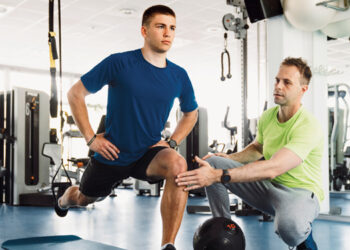 Dealing with breast cancer can be a traumatic experience — both physically and mentally. And, unfortunately, 1 in 8 women will be diagnosed with the disease in the U.S. this year.
Dealing with breast cancer can be a traumatic experience — both physically and mentally. And, unfortunately, 1 in 8 women will be diagnosed with the disease in the U.S. this year.
Fortunately, studies have indicated that moderate physical exercise can improve the quality of life of breast cancer survivors — alleviating both physical and mental symptoms. Which is why, with this knowledge, exercise physiologist Doreen Puglisi, M.S., founded the Pink Ribbon program in 2002, a non-profit program that certifies instructors to train breast cancer survivors.
Based on the founding principles of Pilates, plus the rehab needs of the patient, the Pink Ribbon program helps many survivors by stretching and strengthening the shoulder, chest, back and abdominal muscles. This helps survivors regain a full range of motion, which may have been disturbed after surgery.
One breast cancer survivor helped by the Pink Ribbon program includes Julia Overton, 63, who was diagnosed with breast cancer two years ago. At the time, she and her doctors decided that radiation was the best course of treatment, which left her both nauseous and exhausted.
Overton had been a member of Sport&Health in Ballston, Va., for eight years, and discovered her location offered the Pink Ribbon program soon after her diagnosis.
“I had been taking Pilates for two years at Sport&Health, and the instructor at the time was really excited about the Pink Ribbon program,” said Overton.
As a result, Overton decided to give the program a shot, with her doctor’s approval. The Pink Ribbon program — which promised benefits such as enhanced physical and mental well-being — didn’t disappoint Overton.
“When you hear your diagnosis, life kind of stops, and it’s important to do things that feel normal,” she explained. “For me, that was exercise. I felt like getting up and going to Pilates was positive. Once I got there, I felt so good afterwards.”
Marti Badila, a Pilates trainer and yoga instructor at Sport&Health, became certified in the Pink Ribbon program five years ago. Badila had witnessed both friends and family members be diagnosed with breast cancer, and as a result, knew the program was important.
“It’s a very valuable program,” said Badila. “It teaches you that breast cancer affects the whole body — not just the breasts and shoulders.”
However, strengthening the breast and shoulder muscles, understandably, is the main area of focus during a Pink Ribbon program session. Badila explained that with most of her clients, she starts slowly with mat-based Pilates moves — especially if a client has had surgery — and progresses from there.
“We would begin very slowly, and do simple things like neck stretches,” Badila explained. “Then, we’d begin to do arm raises, and slowly progress to lifting the arms up. For those who had reconstruction surgery that effected their abs, we would do gentle knee slides, for example. As you work with your clients you can begin to add apparatuses.”
Overton explained that she benefited mainly from the flexibility the program returned to her muscles, which felt tight and stiff after her radiation treatments. “It kept me very flexible during that time,” she said.
After Overton ended her radiation, she felt strong enough to return to regular Pilates classes. In fact, Overton still takes Reformer Pilates at Sport&Health two days a week.
According to Overton, it’s important for clubs to offer exercise programs such as the Pink Ribbon program, which specifically help women struggling with breast cancer. “With breast cancer, sometimes there’s a lot of surgery and muscle issues,” said Overton. “The Pink Ribbon program really addresses that. Sport&Health has addressed this huge issue for women.”
Breast cancer is the most common form of cancer diagnosed in women. By offering a program such as the Pink Ribbon program, you will assist the many mothers and grandmothers who make up the 1 in 8 women diagnosed every year.
The Pink Ribbon program was approved by the American Council on Exercise. For more information, visit http://pinkribbonprogram.com.
By Rachel Zabonick
Stay ahead in the fitness industry with exclusive updates!
Rachel Zabonick-Chonko is the editor-in-chief of Club Solutions Magazine. She can be reached at rachel@peakemedia.com.











